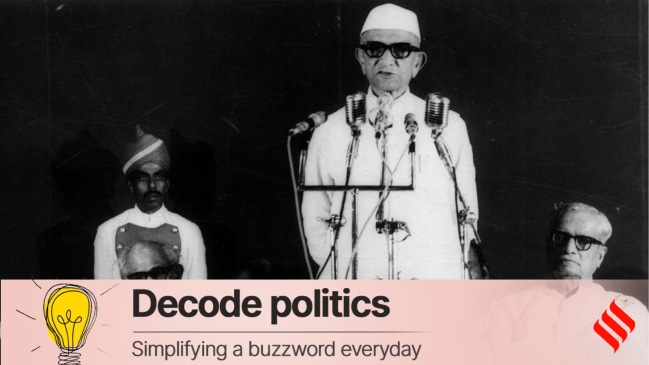Decode Politics: BJP, Congress are both talking Nishan-e-Pakistan, Morarji Desai. Here is why
While BJP taunted Rahul Gandhi with it, Congress has said Janata Party leader Morarji Desai, heading a govt including Jana Sangh, remains the only Indian politician to get Pakistan’s highest award
 Morarji Desai was awarded the Nishan-e-Pakistan in 1988. (Express archive)
Morarji Desai was awarded the Nishan-e-Pakistan in 1988. (Express archive) As the dust around Operation Sindoor settles and political rivals trade barbs over it, the highest civilian honour of Pakistan – the Nishan-e-Pakistan – has found itself at the centre of India’s political discourse, with the Opposition Congress as well as the BJP referring to it to target their rivals.
*What is Nishan-e-Pakistan?
The Nishan-e-Pakistan is Pakistan’s equivalent to the Bharat Ratna, the country’s highest civilian award. It was established under the Decorations Act in the neighbouring country in 1957 and is conferred upon people for “services of utmost distinction to Pakistan’s national interest”.
Apart from the Nishan-e-Pakistan, the country also constituted civilian awards like the Nishan-e-Imtiaz and the Tamgha-e-Pakistan under the Act.
The awards are announced each year on August 14, Pakistan’s Independence Day, and conferred upon the awardees on March 23, Pakistan Day.
* How has it emerged in the political discourse now?
On Tuesday, the award was mentioned by BJP IT cell head Amit Malviya to target Leader of the Opposition in the Lok Sabha Rahul Gandhi. In a post on X featuring a cropped image overlapping Pakistan Army Chief Asim Munir’s face with Gandhi’s, Malviya wrote, “It is not surprising that Rahul Gandhi is speaking the language of Pakistan and its benefactors. He hasn’t congratulated the Prime Minister (Narendra Modi) on the flawless Operation Sindoor, which unmistakably showcases India’s dominance. Instead, he repeatedly asks how many jets we lost – a question that has already been addressed in the DGMO briefings. Curiously, he hasn’t once inquired about how many Pakistani jets were shot down during the conflict, or how many were destroyed while parked in their hangars when Indian forces pounded Pakistani air bases. What’s next for Rahul Gandhi? The Nishan-e-Pakistan?”
The Congress lashed out almost immediately, with the party’s media and publicity incharge Pawan Khera pointing out that it was “their leader” and India’s first non-Congress Prime Minister (and Janata Party leader) Morarji Desai who is still the only Indian politician to have been bestowed the Pakistani honour. “Some more people deserve Nishan-e-Pakistan, like Lal Krishna Advani, who called Jinnah a secular, and the person who went to eat biryani with Nawaz Sharif without being invited (referring to Modi),” Khera said.
On Tuesday, AICC communications in-charge Jairam Ramesh, while slamming the government over sending all-party delegations to various parts of the world in the aftermath of Operation Sindoor, also invoked the award. “It was former Prime Minister Morarji Desai who got Pakistan’s highest civilian honour Nishan-e-Pakistan. The BJP must recall that Desai’s Cabinet had Atal Bihari Vajpayee as the External Affairs Minister,” Ramesh said.
* Why did Morarji Desai get the award?
Desai took over as the PM in 1977, in the elections held after the Emergency in which the Congress led by Indira Gandhi was routed. He headed a government of the Janata Party, comprising many anti-Congress parties including the BJP (in its earlier avatar as the Jana Sangh).
The internal contradictions within the Janata Party meant that the government proved short lived.
In 1988, more than a decade after Desai demitted office and retired from public life, the Pakistan government awarded him the Nishan-e-Pakistan. Islamabad said it was choosing Desai for his “anti-war stance” and the diplomatic measures he took during his tenure as PM (1977-1979) to normalise India-Pakistan relations in the aftermath of the 1971 war.
As his External Affairs Minister, Vajpayee had visited Islamabad where he announced measures such as the stationing of journalists of the two countries in each other’s capitals, more frequent exchange of visits, liberalisation of visa facilities and the general improvement of trade to each other’s benefits. Addressing the press in Islamabad, Vajpayee said the question of Kashmir could be discussed by the two countries, in accordance with the Simla Agreement, only after the process of normalisation of relations between the two countries was complete.
As PM, Desai also advocated normalising ties with China, provided that China returned all Indian territories captured during the 1962 War.
After the Bhutto government announced the Nishan-e-Pakistan for him, the Congress urged Desai not to accept the award. However, despite reservations, Desai accepted the award in 1990.
In 1991, Desai was conferred the Bharat Ratna, thus becoming the recipient of the highest civilian honour in both the countries.
most read
In his autobiography The Story of My Life, Desai wrote about a conversation with a Pakistani minister: “The Pakistani foreign minister once told me that they didn’t expect as much help from Nehru as from me for making peace between the two nations. The policy of threat and blackmail is wrong. I was clear in my mind that friendship can’t be achieved by pampering our neighbours. Pampering would make them more aggressive.”
* Have other Indians also been recipients of Nishan-e-Pakistan?
In 2020, the Imran Khan government honoured Jammu and Kashmir separatist leader and Hurriyat Conference leader Syed Ali Shah Geelani with the award for “bolstering support for Pakistan” and for “his decades-long commitment to the cause of Kashmir”.
In 2023, the current Shehbaz Sharif government bestowed the honour on Syedna Mufaddal Saifuddin, the spiritual head of the Dawoodi Bohras, for “his focus on inter-faith peace, education and healthcare, and his efforts to promote cross-border engagement through social development”. There is a significant population of the Bohra community in Pakistan.





